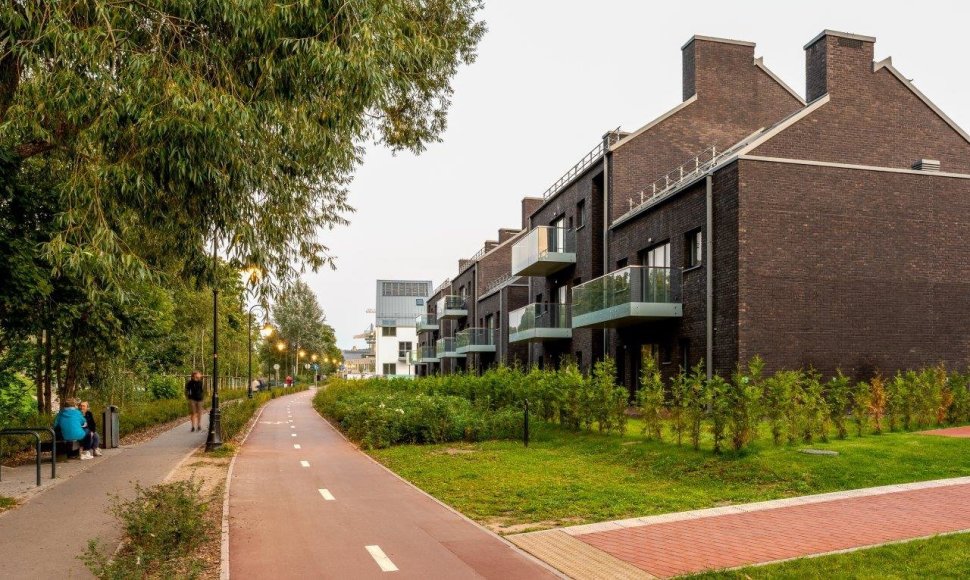Emotions over COVID-19 are settling down
According to Mantas Mikalauskas, analyst at one of Lithuania’s largest living, business and leisure space developers Darnu Group, not even record-breaking COVID-19 infection rates have managed to prevent this breakthrough. Calculating sales of new apartments in the capital, September was the third most fruitful month this year, following February (626 deals) and January (595).
“It appears that it no longer intimidates potential new homeowners, and the public is coming to terms with the virus as a reality of contemporary life. Some might have to abandon parties with numerous tightly packed participants, some might have to get used to a number of face-coverings in the car, but the dynamics of real estate sales in Vilnius and the COVID-19 infection curve currently show that this is no longer a key factor, that limits property purchases,” M. Mikalauskas says.
He notes that together with once again rising customer expectations, there is an accompanying change in bank loan policy, which has shifted from being a prohibitive factor in spring or early summer, to one that is more encouraging once again.
“Having heard “no” from the bank in April, today those buying homes hear a “yes.” And the long-awaited “yes” encourages people to undertake quick action, and make use of the improved situation,” the analyst states.
Increased attention to high-class properties
September was notable for particularly elevated attention to high-class properties. According to M. Mikalauskas, this month, high-class property sales on the capital’s real estate market comprised 17.9 per cent of the total and the combined volume of sales exceeded the same period last year by 34.7 per cent.
Darnu Group alone sold 62 apartments in September in the Paupys area it is developing, which is almost a fourfold increase year on year compared to 2019. Such sales comprised around 60 per cent of all high-class homes sold in Vilnius through September.
“This economic shock has displayed once again that high-class property is the most resilient to price and demand fluctuations. Thus, when buying a home, individuals consider not only its interior décor, but also the future liquidity of the property they are purchasing.
During the pandemic, these buyers were thinking not about the financial hardship that has emerged, but were more concerned with health restrictions and so they made their planned purchases later, but did not adjust their plans. This can be seen through our reservation cancellation statistics over the pandemic period – we only had two cancellations,” M. Mikalauskas reveals.
Investor activity on the rise
According to the specialist, another important factor is increased optimism in the renting sector, which is gradually returning to form. Having withdrawn for a time and afraid to purchase homes for renting, investing purchasers are once again regaining activity.
“Of course, purchasers of such homes are most attracted by opportunities to return to the short-term rent market where they will be able to seek a higher return on investment, but the long-term rent segment has already gained activity as well, and prices have recovered following the sudden drop during the pandemic period,” M. Mikalauskas notes.
According to Mikalauskas, the role of Lithuanians returning to their homeland from emigration is also significant to the capital’s real estate market this year. According to the Department of Statistics, Lithuania saw 17,830 citizens returning over the first eight months of 2020, with more than half of them doing so in the summer.
M. Mikalauskas says that this wave was caused not only by the process of the United Kingdom leaving the European Union and the coronavirus’ impact on the economies of other countries, but also growing opportunities in Lithuania, which has been handling the pandemic successfully so far.
“Lithuania is currently demonstrating it’s potential to both citizens looking to return to their homeland as well as foreigners, for example, Belarussian businesses who are considering moving their staff to this country. We are receiving an increasing number of inquiries from Lithuanians working abroad who are considering purchasing a home while still living in another country and returning to their new home in Vilnius,” M. Mikalauskas notes.












